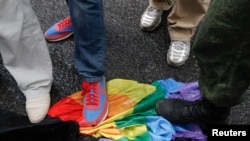NEW YORK —
Russian gay rights advocates called for increased pressure on the International Olympic Committee ahead of the 2014 winter games in Sochi in light of Russia's anti-gay laws, telling a gathering on Wednesday that anti-gay violence is increasing.
Russia has come under mounting human rights criticism internationally since passing an anti-gay propaganda law earlier this year that opponents contend curtails the rights of lesbian, gay, bisexual and transgender (LGBT) people in the country.
Panelists at a Human Rights Watch-sponsored event at New York's Empire State Building cited what they said is a disturbing trend in which homophobes lure gay men through online dating sites into videotaped humiliation and beatings.
“It's a green light for nationalistic groups to make violence against LGBT people,” Maria Kozlovskaya, a program manager at the Russian LGBT Network, said of the Russian law.
The advocates said there is a need to increase pressure against the International Olympic Committee (IOC) to speak out against the conditions of human rights in the country. The games, the first to be held in Russia since 1980, are scheduled to run Feb. 7-Feb.23.
A number of movements supporting Russian LGBT people have recently launched in the United States. Singer Melissa Ethridge and a host of celebrities - including James Franco, Edward Norton and Madonna - launched Uprising of Love, an awareness campaign on International Human Rights Day on Tuesday.
An LGBT sports group, Athlete Ally, began a movement called Principle 6 - referring to the Olympic charter provision banning discrimination - with support from Olympians and professional athletes in the United States. Tennis star Andy Roddick and the National Basketball Association's first openly gay player, Jason Collins, are among those listed as supporters.
“What is important for us is to not turn this campaign into a campaign against Russia,” said Anastasia Smirnova, coordinator at the Russian LGBT Network. “It is a campaign for equality. It is a campaign that promotes the idea of human dignity for LGBT people in Russia, but it is not a campaign against the country.”
European Union Commissioner Viviane Reding said on Tuesday she would not attend the games “as long as minorities are treated the way they are under the current Russian legislation.”
Attempting to dampen international backlash, Russian President Vladimir Putin said in October that gays would be welcome in Sochi. The International Olympic Committee announced earlier this week that Russia would set up protest zones at the games.
Russia has come under mounting human rights criticism internationally since passing an anti-gay propaganda law earlier this year that opponents contend curtails the rights of lesbian, gay, bisexual and transgender (LGBT) people in the country.
Panelists at a Human Rights Watch-sponsored event at New York's Empire State Building cited what they said is a disturbing trend in which homophobes lure gay men through online dating sites into videotaped humiliation and beatings.
“It's a green light for nationalistic groups to make violence against LGBT people,” Maria Kozlovskaya, a program manager at the Russian LGBT Network, said of the Russian law.
The advocates said there is a need to increase pressure against the International Olympic Committee (IOC) to speak out against the conditions of human rights in the country. The games, the first to be held in Russia since 1980, are scheduled to run Feb. 7-Feb.23.
A number of movements supporting Russian LGBT people have recently launched in the United States. Singer Melissa Ethridge and a host of celebrities - including James Franco, Edward Norton and Madonna - launched Uprising of Love, an awareness campaign on International Human Rights Day on Tuesday.
An LGBT sports group, Athlete Ally, began a movement called Principle 6 - referring to the Olympic charter provision banning discrimination - with support from Olympians and professional athletes in the United States. Tennis star Andy Roddick and the National Basketball Association's first openly gay player, Jason Collins, are among those listed as supporters.
“What is important for us is to not turn this campaign into a campaign against Russia,” said Anastasia Smirnova, coordinator at the Russian LGBT Network. “It is a campaign for equality. It is a campaign that promotes the idea of human dignity for LGBT people in Russia, but it is not a campaign against the country.”
European Union Commissioner Viviane Reding said on Tuesday she would not attend the games “as long as minorities are treated the way they are under the current Russian legislation.”
Attempting to dampen international backlash, Russian President Vladimir Putin said in October that gays would be welcome in Sochi. The International Olympic Committee announced earlier this week that Russia would set up protest zones at the games.





